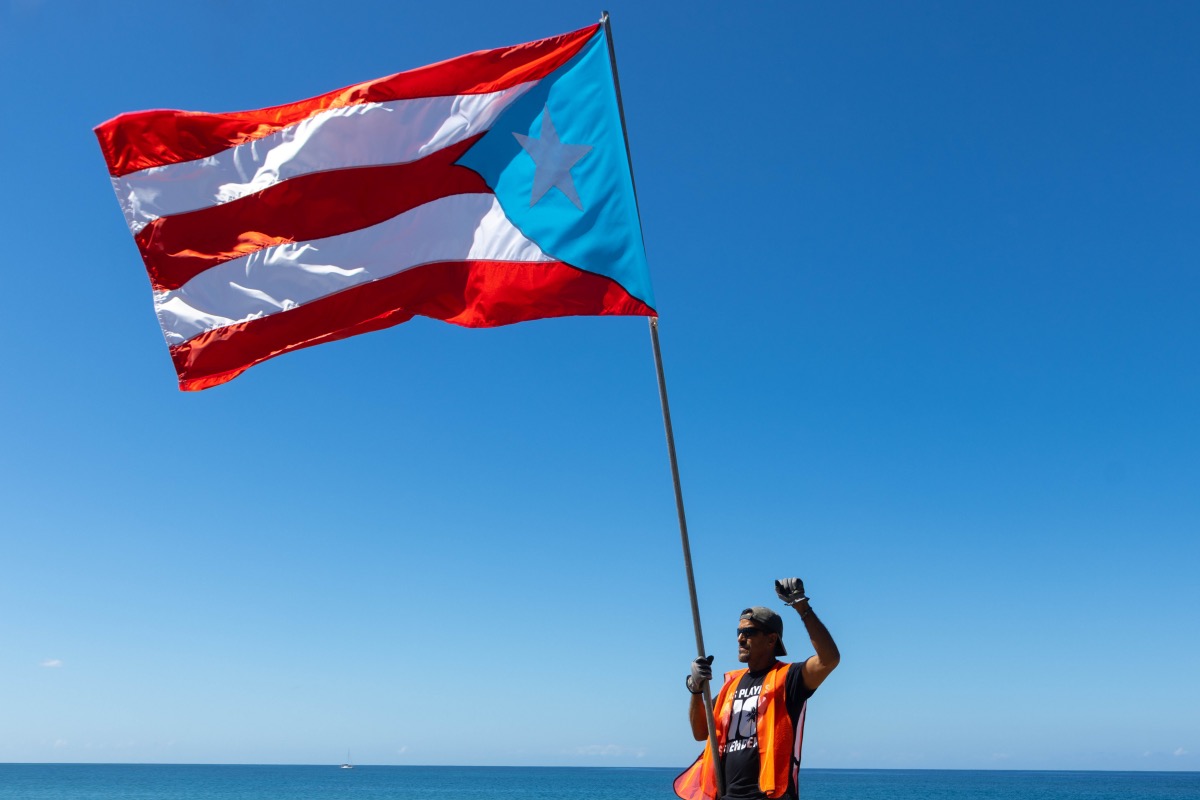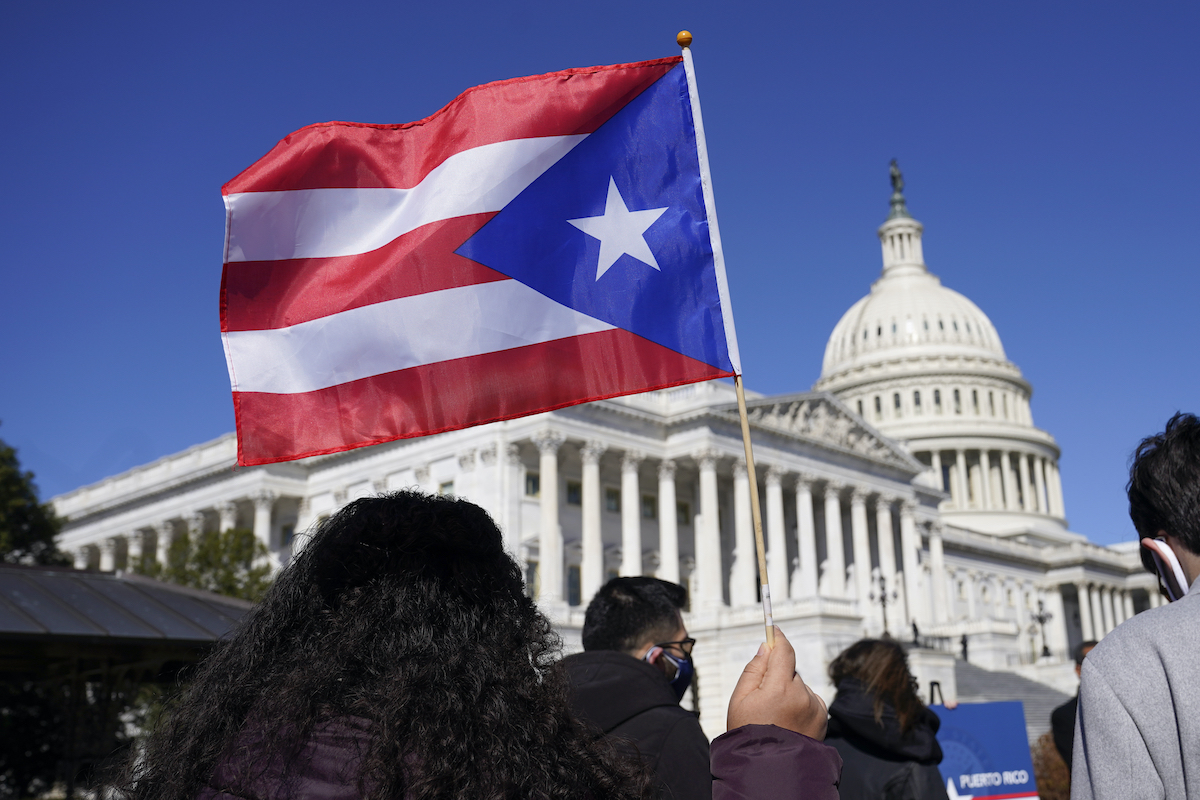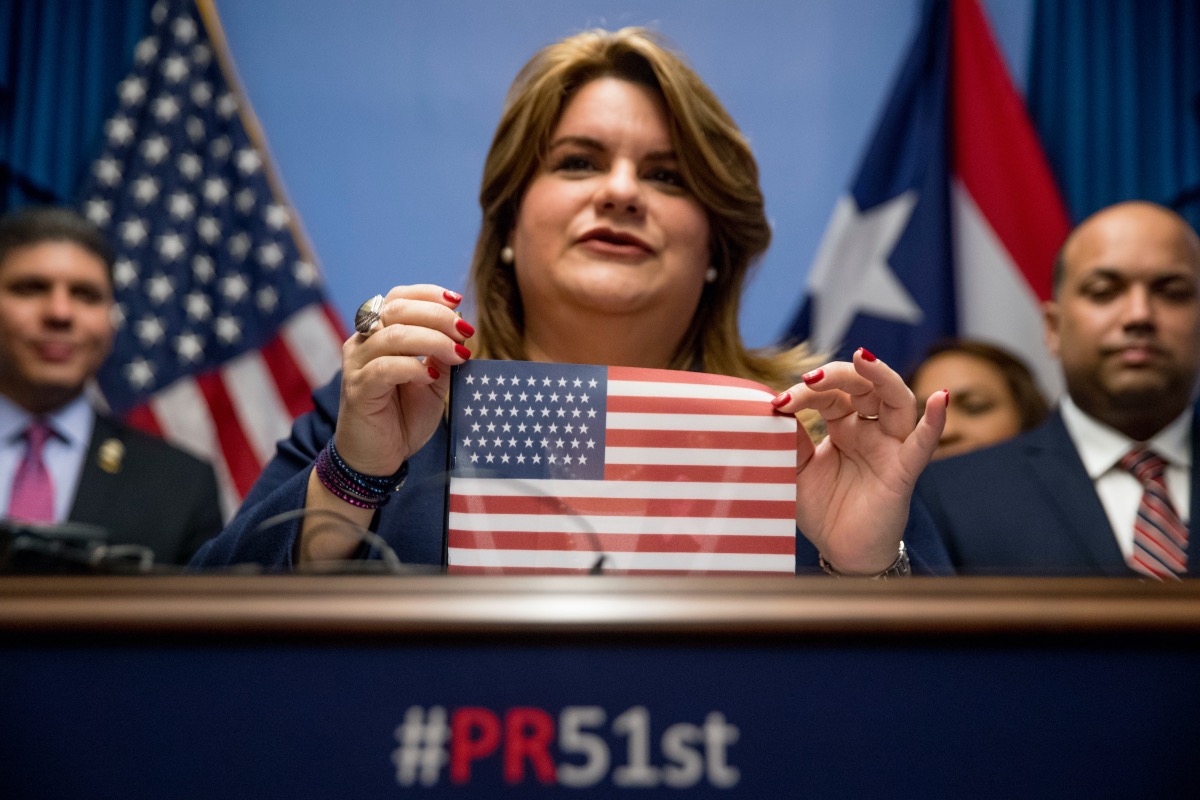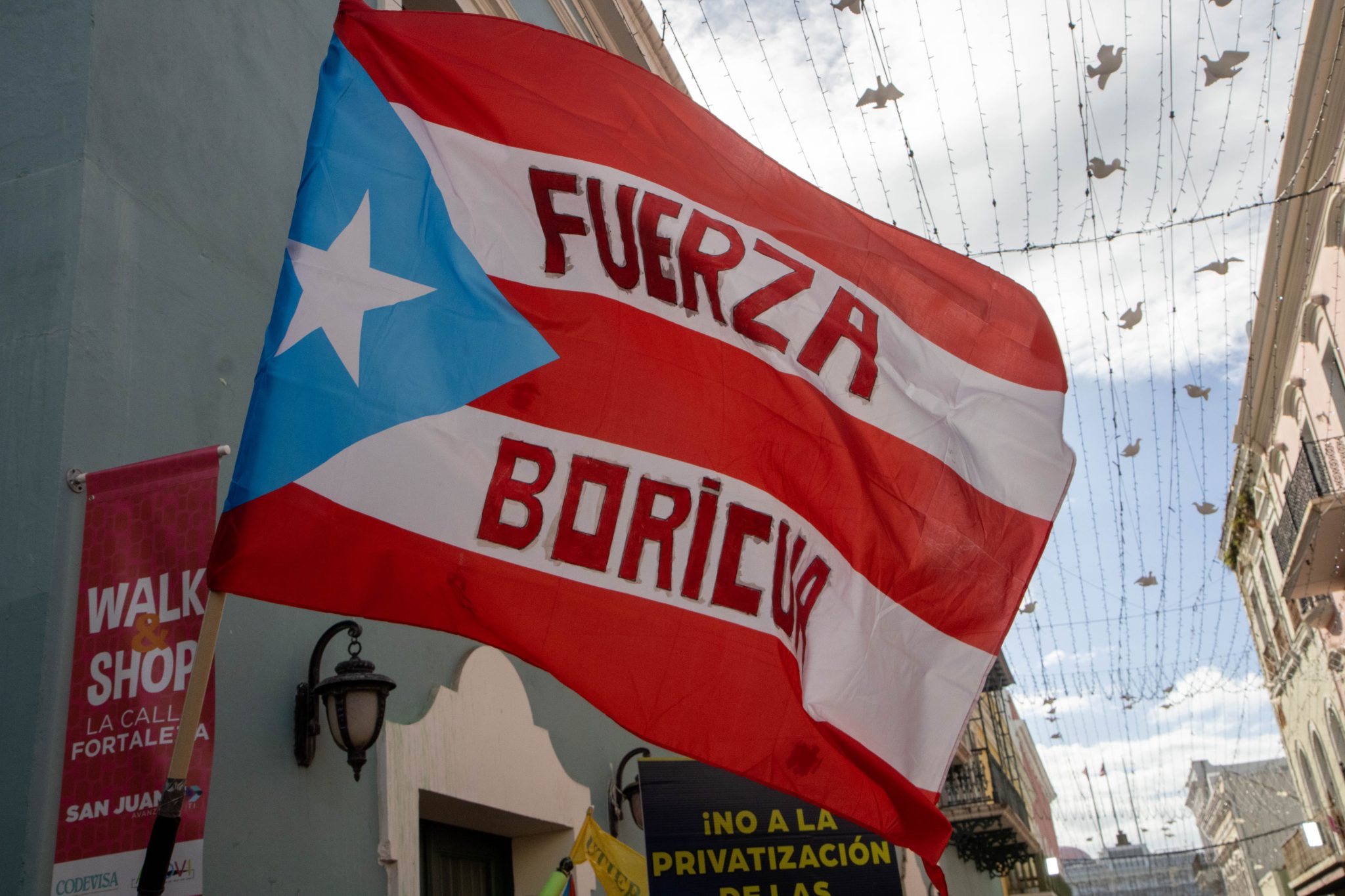

An environmental activist holds Puerto Rico’s light-blue anti-colonial flag with his other fist raised, his shirt reading “The beaches are not for sale,” Rincón, Puerto Rico, Saturday, March 4, 2023. (Carlos Edill Berríos Polanco/Latino Rebels)
For those that follow news and issues related to Puerto Rico, it may come as no surprise that support for statehood within the United States is dwindling not just in Puerto Rico but also in the United States Congress and the country as a whole. Today, being “pro-sovereignty” is mainstream in Puerto Rico, with pro-sovereignty leaders and advocates playing prominent roles in four out of five of its political parties.
Understanding this new reality, U.S. policy on Puerto Rico needs to pivot towards decolonization, national sovereignty, and a strategic partnership with a sovereign Puerto Rico—either as an independent nation or a nation in free association with the United States.
In 2014, Congress’s Government Accountability Office (GAO) indicated in a scathing report that granting statehood to Puerto Rico would have a dire negative effect on the island’s economy, increase its dependency on federal funds, spur the migration of thousands of Puerto Ricans from their country, push U.S. businesses to leave, and be harmful to the United States generally. In essence, according to the non-partisan report, Puerto Rican statehood —or annexation— is not a viable nor smart option for either Puerto Rico or the United States.
Despite the recent reintroduction of the Puerto Rico Status Act (H.R. 2757, formerly H.R. 8393), which seeks to decolonize the island nation, the current pro-statehood colonial administration headed by Gov. Pedro Pierluisi —who was elected by a mere 33 percent of voters in 2020, and thus opposed by 67 percent— continues to encourage corruption schemes, poverty, and dependence on the federal dole. According to reports, Puerto Rican oligarchs who support annexation are running various colonial corruption schemes and networks in Puerto Rico, all on the back of American taxpayers.
Due to these corruption schemes, federal authorities in Puerto Rico have arrested and convicted various high-level leaders and contractors affiliated with the pro-statehood New Progressive Party (PNP) and pro-commonwealth Popular Democratic Party (PPD). Simply said, colonialism and corruption not only block billions in American taxpayer federal dollars from reaching and aiding the people of Puerto Rico, but also further enrich the coffers and lifestyles of Puerto Rico’s colonial elites and their families, most of whom are members of the pro-statehood party.
On March 22, another corrupt pro-statehood mayor, Ángel Pérez Otero —who was also president of Puerto Rico’s Mayors’ Federation— was convicted in federal court for bribery, extortion and corruption. Court testimony uncovered a plethora of more corruption that impacts all levels of Puerto Rico’s colonial government, from local municipalities to the governor’s office. Even the governor’s cousins, who were involved in his election campaign, were arrested by federal agents and pled guilty to embezzling $3.7 million in federal funds intended for public housing projects.
Puerto Ricans have had enough of corruption and are looking to alternatives that will not only clean up the corruption but also deliver a truly representative government committed to decolonization, social justice, and real economic development. With the approaching elections in 2024, Puerto Ricans sick of colonialist policies that encourage dependence and poverty have reason for optimism. A political coalition that supports democracy, social justice, decolonization, anti-corruption measures, and economic growth has a real chance of finally deposing the corrupt PNP-PPD duopoly, and this coalition is now being negotiated and developed.
The Citizens’ Victory Movement (MVC), the Puerto Rican Independence Party (PIP), various independent candidates, and several civil society and community organizations would make up this grand national electoral coalition, known as Alianza País. Though the corrupt pro-statehood party modified local electoral law in 2011 to ban such coalitions —thus aiming to artificially divide the opposition and suppress the voice of the people— the strategists of Alianza País are currently planning to circumvent the anti-democratic ban via legal action and joint candidates and looking at how to best to unify their forces to win the upcoming election.


A woman waves the flag of Puerto Rico during a news conference on Puerto Rican statehood on Capitol Hill in Washington, Tuesday, March 2, 2021. (AP Photo/Patrick Semansky)
This week Juan Dalmau Ramírez, secretary general of the PIP and one of the leaders of Alianza País, will be in Washington, D.C. to meet with congressional leaders and high-ranking officials to discuss Puerto Rican decolonization and other important issues. If chosen as the gubernatorial candidate for Alianza País, Dalmau Ramírez has a real and historic opportunity to become governor of Puerto Rico in 2024.
Today, while the PIP is the political party in Puerto Rico that has increased support and regularly raised more money than any other party —via grassroots campaigns, small donations, and events— the MVC has inspired many across the political spectrum and expanded its political and community support networks throughout Puerto Rico. In fact, both the PIP and the MVC have also expanded their networks throughout the Puerto Rican diaspora and across the United States.
In contrast to the political subordination, colonial isolationism, and chronic dependence and poverty promoted by both the PNP and PPD, pro-sovereignty Puerto Ricans and their allies in the United States are working to end colonial rule and establish a lasting relationship with the U.S. based on sovereignty, equality, respect, friendship, cooperation, and shared interests. After centuries of foreign rule, Puerto Ricans deserve their own democratic and sovereign country.
Americans must understand that even though 52 percent of voters supported statehood in the 2020 “non-binding” plebiscite, when the total number of registered voters (2,355,894) is taken into account, only 27 percent actually voted for statehood—yes, 27 percent. In a plebiscite that the U.S. Department of Justice openly delegitimized, 73 percent of all registered voters did not support statehood.
Now, even if you accept that statehood won with 52 percent —a significant decrease from the laughable 97 percent that statehooders claim to have won in the boycotted plebiscite of 2017— the United States has shown its unwillingness to annex a country where almost half of the voters do not support statehood, as doing so would be disastrous for both sides.


Resident Commissioner Jenniffer Gonzalez-Colon (R), who represents Puerto Rico as a nonvoting member of Congress, holds up an American flag with 51 stars, speaks about Puerto Rican statehood during a news conference on Capitol Hill in Washington, Tuesday, October 29, 2019. (AP Photo/Andrew Harnik)
Additionally, a number of pro-sovereignty candidates from other parties were elected to the Puerto Rican legislature in 2020, and the pro-democracy PIP earned renewed electoral support. In the same year, María de Lourdes Santiago (PIP) garnered the most votes in Puerto Rico’s Senate. Along with the PIP, pro-sovereignty and pro-independence leaders also lead the progressive MVC as well as the right-wing conservative Proyecto Dignidad, whose current senator, Joanne Rodríguez Veve, is also an independence advocate.
From left-wing to right-wing, pro-sovereignty leaders represent a growing swath of the Puerto Rican electorate.
The pro-commonwealth PPD has been in a painful waning spiral of deflation since 2016 due to scandals, lack of vision, infighting, and corruption investigations, with various prominent pro-sovereignty leaders and advocates (soberanistas), such as representative Luis Raúl Torres and former San Juan mayor Carmen Yulín Cruz, leaving the party for good—they have either joined the MVC, become independents, or remain as unaffiliated. As the retrograde and out-of-touch PPD leadership continues to support the colonial status, many long-time pro-sovereignty supporters are waking up and jumping ship.
Meanwhile, many conservative voters, tired of all the arrests, shenanigans, humiliations, and public corruption schemes of the pro-statehood party —which currently being investigated by the FBI— are said to be switching over to the right-wing Proyecto Dignidad. If this trend continues, the PNP is in trouble—but, of course, statehooders don’t want Americans to know this.
The political tides are shifting in Puerto Rico, and despite what statehood advocates assert through highly paid lobbyists and old jingoistic narratives, neither Puerto Ricans nor the U.S. Congress desires annexation for Puerto Rico. Even the U.S. Department of Justice has disregarded these phony non-binding plebiscites.
The trend is clear: As statehood falls out of favor in Puerto Rico and D.C., support for national sovereignty grows and becomes more accepted as a viable option for Puerto Rico.
A growing number of Puerto Ricans and Americans alike understand that annexation is not a realistic and viable option for either country for political, economic, and cultural reasons. Together, the sovereignty options of both independence and Free Association received nearly 40 percent of the vote in the 2012 plebiscite—not bad, considering pro-sovereignty and independence advocates have been terrorized, persecuted, arrested, and murdered by the colonial regime, “equality-loving” statehooders, and colonialists for more than a century. Times are changing.
In addition, the more the Free Association option is defined by Congress, the more support it seems to earn among Puerto Ricans. This is because Free Association —increasingly considered the consensus option— enables Puerto Rico to become a sovereign nation, protect its language, culture, and sense of national identity, safeguard and increase its international representation, establish foreign relations and beneficial treaties, and develop a strong national economy—while maintaining significant, important, and strategic relationships with the United States. Free Association is a win-win for both countries.
The time has come to recognize that the two sovereignty options presented in the Puerto Rico Status Act —independence or Free Association— are the only viable and dignified options for Puerto Rico in light of the decline of the statehood and commonwealth options and Congress’s consistent stance on against annexation. Republican and Democratic leaders in Congress —from Republican Sens. Mitch McConnell (KY) and Lindsey Graham (SC) to Democratic Sens. Chuck Schumer (NY) and Joe Manchin—- have consistently shut the annexation door in Puerto Rico’s face, yet statehood lobbyists and pro-statehood politicians shamelessly continue to beg and harass members of Congress for annexation. It’s embarrassing.
While statehooders keep trying to gain acceptance and blatantly supplicate their way into a country they are not wanted in just so they can have access to more federal funds and welfare, pro-sovereignty leaders and experts are instead ready to sit down with the U.S. government to discuss the decolonization and transition plan to national sovereignty, democracy, and true economic development for Puerto Rico.


An anti-colonial Puerto Rican flag with the words “BORICUA STRENGTH” at a march in San Juan, Puerto Rico, Sunday, November 27, 2022. (Carlos Edill Berríos Polanco/Latino Rebels)
Sovereignty is the intelligent, inevitable, and reasonable bipartisan response to this political problem that has been plaguing the United States and Puerto Rico for over 125 years. After transitioning the Philippines to independence in 1946 and transitioning the Marshall Islands (1986, Micronesia (1986) and Palau (1994) to sovereignty through free association, Puerto Rico, the world’s oldest colony, must be next in line to achieve freedom and national sovereignty, either as a fully independent nation or a sovereign nation in free association with the United States. Freedom is the only viable and dignified path forward.
A transition to sovereignty would put an end to Puerto Rico’s dependence on American taxpayer money and usher in a new era as an ally and strategic economic partner of the United States. Many Puerto Ricans, as well as the Alianza País leadership, also advocate for the establishment of a Status Assembly that would represent all non-territorial options and seek to negotiate a way forward directly with the United States.
The only practical way for Puerto Rico to decolonize, democratize, and safeguard its economic future and maintain its national identity is through national sovereignty. Trends are indicating that as support for statehood declines, support for national sovereignty grows. Republicans and Democrats must recognize and embrace this trend and finally decolonize and free Puerto Rico.
***
Javier A. Hernández is a Puerto Rican writer, linguist, small business owner, and pro-sovereignty activist and advisor. He is the author of PREXIT: Forging Puerto Rico’s Path to Sovereignty, Puerto Rico: The Economic Case for Sovereignty, and various other books and articles on Puerto Rico decolonization and sovereignty. He is also a collaborator of VAMOS, MAP, the Puerto Rican Alliance, and other pro-sovereignty organizations in Puerto Rico and the United States. Twitter: @PRexitBook



Bueno, empecemos, en cuanto a la anexión los datos están bastante correctos, lo que no dije se dice es que la anexión está proscrita en el derecho internacional para países invadidos y ocupados como es el caso de Puerto Rico. Y el caso de Puerto Rico es un caso de Derecho Internacional y violación de los Derechos Humanos de todo un pueblo. No es un asunto interno de Estados Unidos, como tampoco un asunto de derechos civiles. La solución siga siendo la Independencia, avalada esta por la Resolución 1514(XV) de las Naciones Unidos.
vamos a estar claros no hay una solución de dos soberanías, la soberanía solo es posible en la Independencia. Y me dirán y los tratados de “libre asociación en el Pacífico” y la contestación real es que ninguna de ellas tienen soberanía la misma reside en las antiguas metrópolis, ni las Marianas, de EEUU, ni las islas Niue de Nueva Zelandia tienen soberanía real. Entonces este cuento de dos soluciones de soberanía es puro cuento de un sector colonialista que quiere aparentar cambios pero es puro gatopardismo. La solución, la descolonización es Independencia, todo lo otros son cuentos de camino. Nota curiosa, los colonialistas libre asociacionista ni siquiera piden esa libre asociación con China, país en crecimiento, en proceso de convertirse en el hegemón mundial sino con EEUU, país en picada, neoliberal, imperialista y racista, interesante verdad… El colonialismo es cosa mala.
Este es un artículo de encargo al servio del colonialismo y de la narrativa imperial que solo busca perpetuar la colonia en nuestra nación invadida y ocupada. Hábilmente creada para tergiversar, confundir y crear el espejismo de ser una postura que pregona el fin del colonialismo en Puerto Rico, pero es la expresión clara de como los sectores más reformistas se han apropiado y tergiversan las narrativas de lucha radical-revolucionaria para neutralizar la misma.
Llegó el lloriqueo estadista